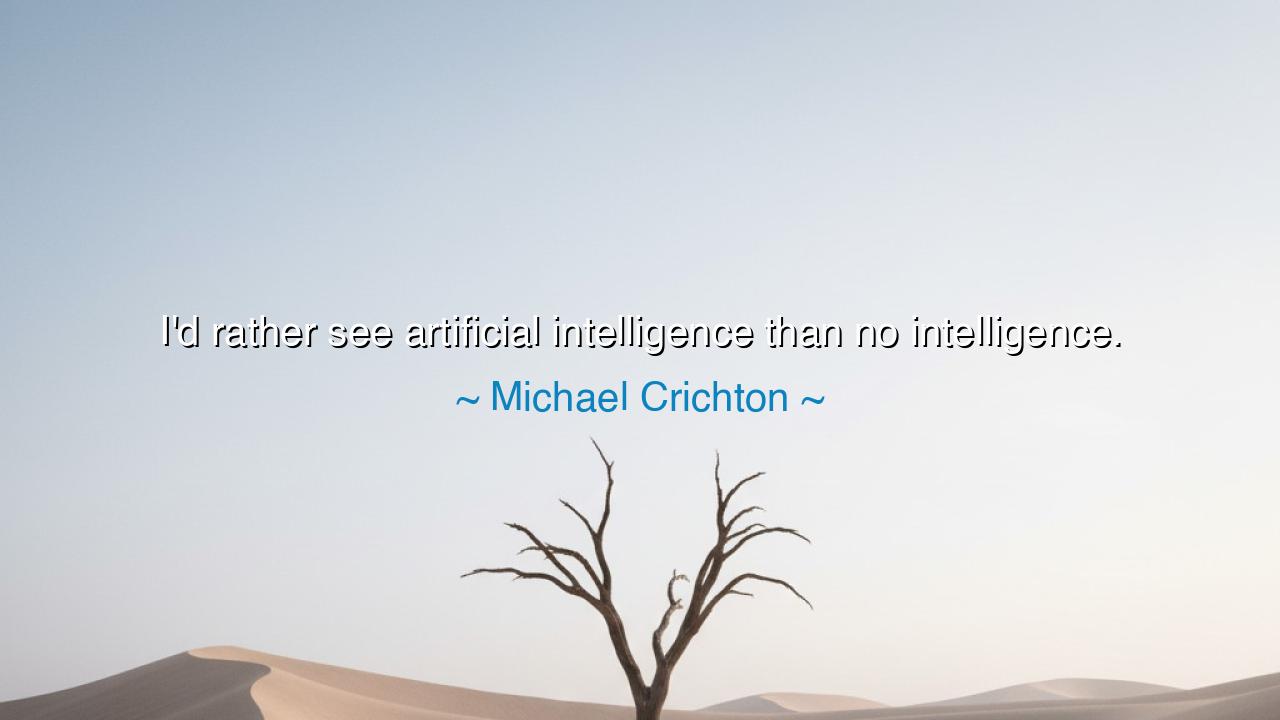
I'd rather see artificial intelligence than no intelligence.






In the provocative words of Michael Crichton, "I'd rather see artificial intelligence than no intelligence," we are faced with a deeply philosophical reflection on the nature of knowledge, innovation, and the human condition. Crichton offers a bold stance on the relationship between technology and humanity, suggesting that even the most artificial forms of intelligence, those born from machines and algorithms, are preferable to a world devoid of thought, reason, or understanding. This statement raises important questions about the role of artificial intelligence in modern society, challenging us to consider whether the presence of intelligence—whether human or machine—is preferable to the absence of it entirely.
The ancients were equally concerned with the nature of knowledge and intelligence. In Plato’s Republic, the philosopher Socrates argues that reason and intelligence are essential to achieving a just society. Without these, chaos and ignorance would reign. For Plato, the pursuit of wisdom was the highest calling, one that could only be achieved through careful reasoning and thought. Even though Socrates would have likely found the concept of artificial intelligence foreign, his core belief that intelligence is crucial to the functioning of a society mirrors Crichton’s modern assertion that some form of intelligence, even if artificial, is better than none at all.
Consider the story of Aristotle, who famously classified knowledge into different categories, from practical knowledge (techne) to theoretical knowledge (episteme). His system of thought, still revered in the Western tradition, exemplifies the importance of intelligence in structuring the world around us. Aristotle did not distinguish between human intelligence and other forms of reasoning; instead, he believed that all forms of intelligent thought should serve the greater good of humanity. In this light, Crichton’s belief in the superiority of artificial intelligence over no intelligence can be seen as an extension of Aristotle's view: that the pursuit and application of reason, no matter the form it takes, is essential to advancing both individual and collective progress.
In our modern world, the advent of artificial intelligence has revolutionized numerous fields, from medicine to technology. Take, for instance, the work of IBM’s Watson, which has demonstrated the ability to analyze data and make decisions in ways that far exceed human capabilities. Watson’s intelligence has been used to diagnose diseases, recommend treatments, and even assist in solving complex scientific problems. While Watson’s intelligence is clearly artificial, it has nevertheless proven to be an invaluable tool, one that Crichton might argue is preferable to the absence of reason altogether. In a world increasingly driven by data, logic, and analysis, even artificial intelligence can provide critical insights and solutions where human intelligence alone may not suffice.
Crichton’s words are also a reflection of the fear and uncertainty that surrounds the development of artificial intelligence. While there are concerns about the ethics of AI and its potential to surpass human control, there is a recognition that the future of intelligence may not lie solely with human minds. This sentiment harkens back to the ancient myth of Prometheus, who defied the gods to bring fire—an essential tool of civilization—to humanity. Though Prometheus acted with noble intentions, his gift was seen as both a blessing and a curse. Artificial intelligence, like Prometheus's fire, has the potential to be both a force for great good and a source of danger. Yet, Crichton suggests that even in its uncertainty, artificial intelligence is better than ignorance, as it provides humanity with a tool to solve problems and overcome obstacles that might otherwise seem insurmountable.
The lesson to be drawn from Crichton’s quote is one of adaptation and acceptance. The rise of artificial intelligence forces us to confront the limitations of human knowledge and the need to embrace new forms of intelligence. AI, in its many forms, offers solutions and possibilities that might have been unimaginable even a few decades ago. But rather than fearing its potential, we must learn to work with it—to use artificial intelligence as a tool to complement our own human intelligence. Just as the ancients sought to expand human understanding through learning, discourse, and experimentation, we too must seek to expand our horizons by integrating technology with our traditional sources of knowledge.
In practical terms, Crichton’s perspective urges us to embrace technology as a means to enhance our lives and solve problems. We must recognize that artificial intelligence, when used wisely and ethically, can augment human capabilities rather than replace them. Whether in fields like healthcare, education, or even art, AI can assist us in making more informed decisions and solving complex problems. But it is crucial that we maintain a sense of balance and control—understanding that artificial intelligence is a tool, not a replacement for human wisdom and compassion. The future of intelligence is not about choosing between human and artificial forms but about harmonizing both to create a world that is wiser, more compassionate, and more effective in addressing the challenges of our time.






AAdministratorAdministrator
Welcome, honored guests. Please leave a comment, we will respond soon